 Let’s be very clear. No matter what the blog post or letter from Mark Zuckerberg may say (or update blog posts), Facebook’s new privacy settings have far less to do with “making privacy simpler” than they do with one simple fact:
Let’s be very clear. No matter what the blog post or letter from Mark Zuckerberg may say (or update blog posts), Facebook’s new privacy settings have far less to do with “making privacy simpler” than they do with one simple fact:
Facebook has “Twitter-envy”.
Twitter is essentially the center of the public “real-time web” and is getting all the attention, hype and buzz. Facebook is not getting that attention and wants to be your single portal to the Internet.
Facebook wants you to share your information PUBLICLY.
The new “Privacy Policy” is not so much about protecting your privacy as it is about getting you to make more information public.
Let’s be clear. THAT is the goal. If Facebook were serious about making it easier to protect your privacy, the recommendations would be different. The “making privacy strong” theme is spin. And judging by articles I’m seeing in the mainstream media, it’s working. Now, to be fair, there are some improvements, like the ability to change the privacy settings of each post you make, but that improvement is overshadowed by the larger danger.
THE DANGER
The fundamental issue is that when you are brought into the new “privacy transition tool”, the “recommended settings” are that you share all your status updates, links, photos, videos and notes publicly. Not just with other Facebook users, but with the entire Internet. By accepting the recommended settings, you are agreeing to make all the info you put into Facebook accessible through search via Google, etc.:
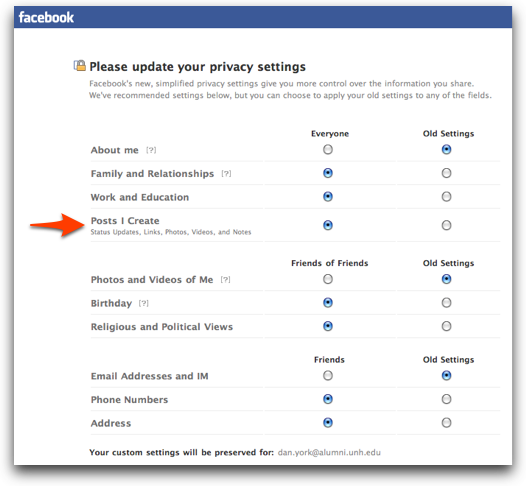
So all those silly status updates you wrote? Found in Google. All those “private” photos of your family that you previously just shared with friends? Found in Google. All those longer notes that you were sharing with your friends? Found in Google. Whether or not you are single or married? Found in Google.
It is a fundamental shift in information sharing from being inside a private walled space to being in an open public space.
Everything you publish – available to everyone on the Internet.
The danger I see is that many, if not most, people will simply accept the recommended settings. And suddenly information they thought was kept more private will be shared with the world.
HOW TO PROTECT YOURSELF
My recommendations are very simple:
1. Do NOT accept the recommended settings. Choose “Old Settings” in the Transition Tool.
2. Go into the Privacy settings and examine all settings. Click the “Privacy” link at the very bottom of a Facebook page or going into “Settings” in the upper right corner and then click on “Privacy”.
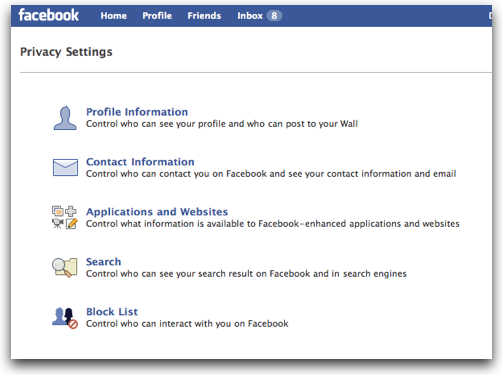
3. Change who can see your profile information. Click on “Profile Information” to decide who you want to see information about you.
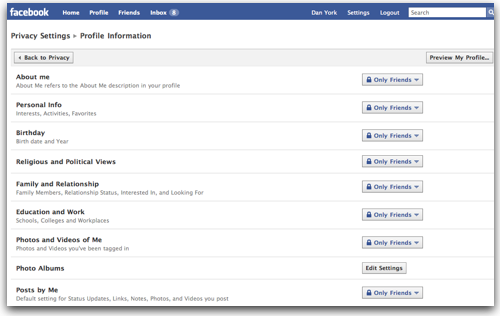
4. Change you can see your contact information. Click on “Contact Information” to decide who can see your contact info:
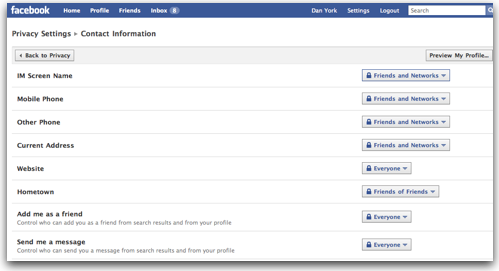
5. CHANGE WHAT YOUR FRIENDS SHARE ABOUT YOU! This is a critical one. Whenever your friends go off and play one of those games like Mafia Wars or Farmville, or take one of those zillion quizzes, they are sharing information about you, including with “game developers” who have questionable backgrounds. Everytime any friend of yours adds any Facebook “application”, they are sharing info about you.
Click on “Applications and Websites” to see where you can turn it all off:
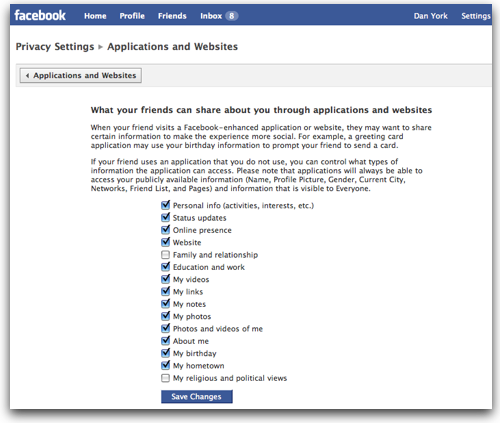
Personally, I’ve unchecked all of these items. If one of my “friends” on Facebook decides to start interacting with a new Facebook application, that is their choice. But I don’t necessarily want that external company or organization to get all this information about me.
I admit that I find it rather annoying that Facebook provides no way in its new “Privacy Transition Tool” to change these settings. You have to go into these settings to change it.
6. Change what information is accessible via search. Click on “Search” to change whether you want your information to be found via a Google Search:

If you go through each of these panels and make sure the changes reflect how you want your information shared, you’ll wind up in a much better space with regard to privacy.
THE EVEN GREATER DANGER
There is an even greater danger to privacy lurking in the fine print:

Facebook has reclassified what is “publicly available information”. Your name… profile photo… and friend list are now “visible to everyone“. And guess what?
There’s nothing you can do about that (except, perhaps to not use any applications).
It’s just the price of using a walled garden service like Facebook where a single company is in charge.
THE DISAPPOINTMENT
I understand Facebook’s business need to push people to share more information. They feel they need to be the center of the “real-time web”… and they feel that Twitter is in a better place to be that. But I find it annoying and frustrating that so many users are now going to find their “private” information publicly accessible out on the public Internet simply because they accepted the “recommended” settings.
Bad move, Facebook.
You point out some very interesting issues, ones that have the potential to destroy the trust that Facebook has built up with their user base.
It’s Facebook’s responsibility to clearly communicate the changes and the resulting effects they will have on users. I think you’ve clearly pointed out that they haven’t done so, and instead wrapped the changes in a veil of called “ease of use”. That is concerning.
I do, however, thing the DANGER and FEAR that you’ve outlined here is a bit mis-directed.
Yes Facebook needs to be clear, yes there is a concern over sharing too much info and yes there is a VERY good reason to read a “how to keep your privacy” post that you’ve written here.
However, anyone who uses the Internet, should be doing so with the understanding that Privacy is more of an illusion than a reality on the net. From ISP logs to hackers to employees of net companies, there is no shortage of ways your personal information can get into the wrong hands.
So instead of being AFRAID, be prepared. Don’t post anything online that you might regret, or that you wouldn’t want someone to find.
The opportunities that exist for individuals or companies to interact in more public environments is one that I embrace. Even if it’s more of a Christian side hug than a full on make out session. ( http://www.youtube.com/watch?v=m_Oj0-splZw )
Thanks for the interesting read.
ps. I think your last point is the one that really irks me.
“But I find it annoying and frustrating that so many users are now going to find their “private” information publicly accessible out on the public Internet simply because they accepted the “recommended” settings. ”
That’s not right.
Jess, from what I read here you’re essentially taking the view that whatever people previously thought they were sharing with a select group of friends and family they should now be OK with that being publicly available?
My other half logged in to Facebook this morning to be confronted with this screen and she was nonplussed – when I explained “everyone = the whole world” her response was “why should anyone want to share with the whole world?’ The recommended setting suits Facebook and Facebook alone – that’s hardly fair. Just because Facebook wants to be Twitter doesn’t mean Facebook’s users do.
@Jess – Thanks for the comment and yes, my personal mantra for probably 20+ years now as been “Never put anything online that you don’t want to have appear on the front page of the New York Times.” (and, yes, I should probably update that to be ‘the top of CNN.com’ or something like that)
However, I’m a techie and I understand the myriad ways that your data can be exposed. Many if not MOST more non-technical users, though, just *use* the services out there and don’t necessarily think about the privacy ramifications. I think there will be more incidents in the future that will open people’s eyes up to these issues… but I think many people today are more like Charles’ other half who, rightly or wrongly, just *expect* that there will be some level of privacy.
And yes, that last point of mine REALLY annoys me.
@Charles – thanks for relaying the story, and I liked your last line (“Just because Facebook wants to be Tiwtter doesn’t mean Facebook’s users do”)
http://valleywag.gawker.com/5423914/facebook-ceos-private-photos-exposed-by-the-new-open-facebook/gallery/?skyline=true&s=x
I agree with that.
and ya, you should probably update it to “Never put anything online that you don’t want to have appear as a trending topic on twitter.”
or something.
Found your blog post via @Ed Shahzade’s twitter.
Thanks for the heads-up about the Applications issue (“THE EVEN GREATER DANGER”) – I’d overlooked that one.
Here’s another one: the Pages that Facebook members belong to/are fans of can be seen by everyone (there’s no privacy setting to change that). It’s a great way for identity thieves to find your interests.
Isha
Lol I didn’t find you through @Ed, but through @lynnterry via Erin of http://netkickstart.com/hub/
Feel free to edit my comments accordingly (as I’m sure you will)
Isha 🙂
PING:
TITLE: Jason Calacanis, Facebook, Privacy and the Open Internet
BLOG NAME: Disruptive Conversations
Last week Jason Calacanis ripped into Facebook and privacy in his typical “hold-nothing-back” style: The Big Game, Zuckerberg and Overplaying your Hand He brings a poker spin to the Facebook story and states how Facebook is, in his opinion, “overplayin…